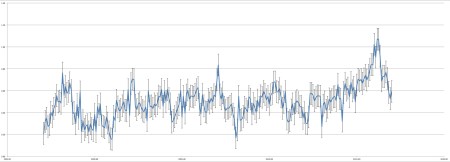“What you see is that the slowdown just goes away.” –Thomas Karl (NOAA), Science Magazine, 4 June 2015.
“The slowdown hasn’t gone away.” –Peter Stott (Met Office), The Sunday Times, 12 February 2017

A story in the Sunday Times confirms that the UK Met Office does not accept Karl et al.’s denial of the global warming hiatus and acknowledges that, ‘the slowdown hasn’t gone away.’ Writing in this week’s New Scientist, Michael Mann claimed that the pause is an ‘utterly debunked idea’ and ‘in the final analysis was much ado about nothing,’ and a ‘favourite climate contrarian talking point.’
The pause is real and it contains lots of interesting science, there are over 50 explanations proffered for it. But is also has another effect in that is shows the diversity of opinion in climate science, which on this important topic is certainly not settled. Who can deny that climate science is divided over this crucial issue? –- David Whitehouse, GWPF Observatory, 12 February 2017
A scientific controversy over the impact of climate change on oceans has taken a new twist with research suggesting they are warming more slowly than thought. Scientists have analysed millions of readings from across Earth’s oceans between 2000 and 2015, finding that sea surface temperature is rising at 1.17C per century compared with the 1.34C per century of previous estimates. The difference is tiny in everyday terms but is important because the oceans are so large that even a warming by a tenth of a degree represents a big increase in the energy they store — and the potential impact on climate. It is also politically potent, especially in America where an increasingly climate-sceptic Republican party will see it as confirmation of a suspected slowdown in global warming and evidence that previous warnings were exaggerated. –Jonathan Leake, The Sunday Times, 12 February 2017
The changes made by Karl et al. were influential but small and temporary and are turning out to be irrelevant anyway because of what the data is actually doing. Should anyone still think that the higher trends that include the years 2015 and 2016 are due to long-term global warming take a look at HadCRUT4, Fig 3, where you can see the deviation caused by the recent strong El Nino. One can see the decline to 2014 temperatures and the return of the “pause.” — David Whitehouse, GWPF Observatory, 6 February 2017
Yet perhaps more damaging is the claim from some in the green lobby that our disclosures are small beer. In fact, their importance cannot be overstated. They strike at the heart of climate science because they question the integrity of the global climate datasets on which pretty much everything else depends. The only ‘fake news’ in our revelations is the claim that they don’t matter. In truth, they are hugely damaging, for they suggest an agreement made by figures such as Barack Obama and David Cameron rested in part on research that had not been published with integrity. This is an age where many have come to question the role of experts. Restoring trust demands transparency. Al Gore famously said: ‘The science is settled.’ It is not. We cannot allow such a vital issue for our future to be mired in half truths and deceptions. –David Rose, Mail on Sunday, 12 February 2017
Once this scandal has been properly brought out into the open, it will raise the most disturbing question mark yet over the promotion of the greatest and costliest scare story the world has ever known. –Christopher Booker, The Sunday Telegraph, 12 February 2017
A new analysis shows that censorship has steadily increased at universities, with 94 per cent of campuses having some restrictions on freedom of expression, up from 90 per cent last year and 80 per cent in 2015. A university free speech ranking compiled by the radical online magazine Spiked found nine instances of campus bans on fancy dress costumes, 21 bans on visiting speakers, 16 bans on student societies, 17 bans on advertisements and 21 bans on tabloid newspapers in the past three years. –Greg Hurst, The Times, 11 February 2017


















